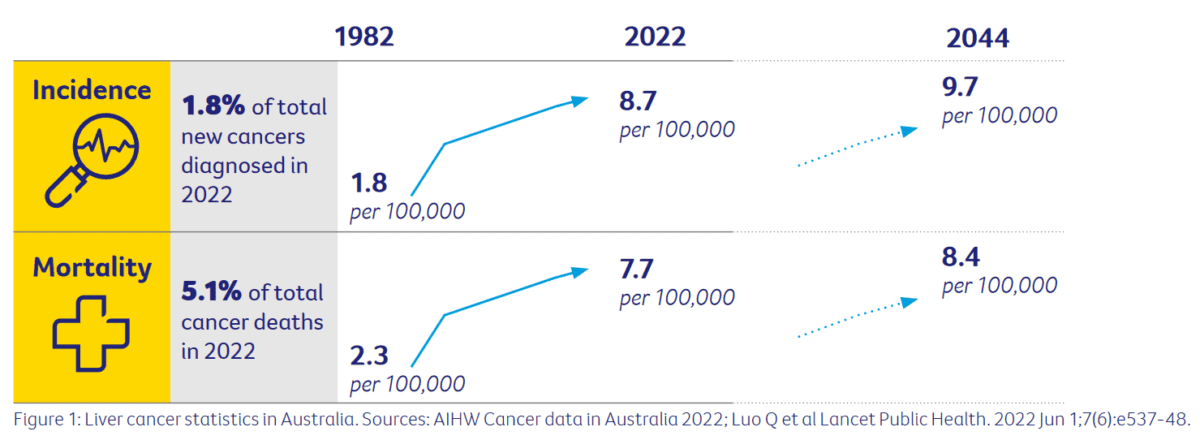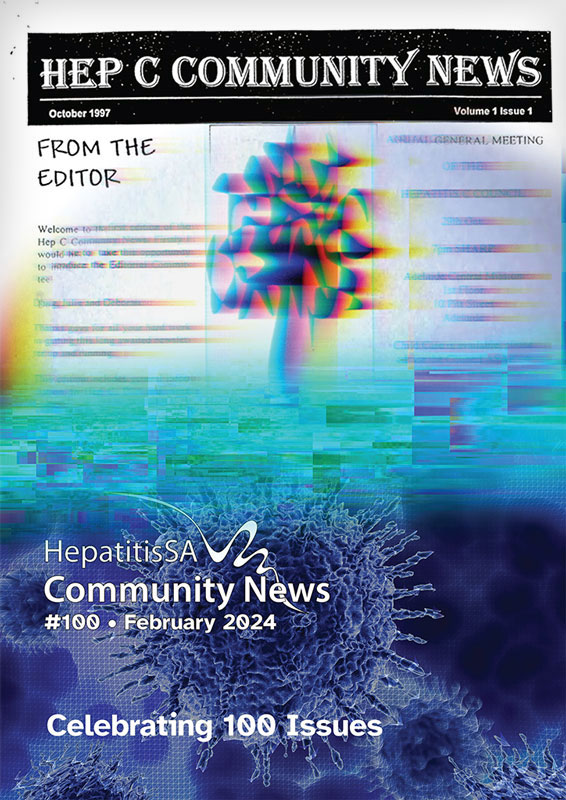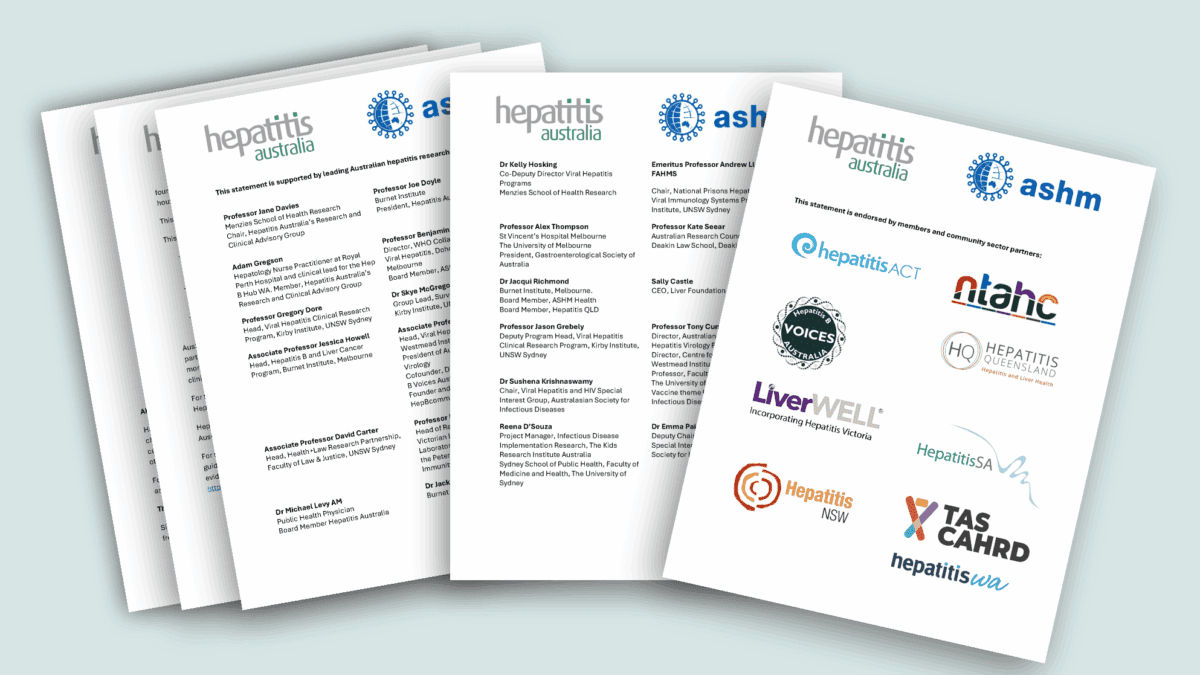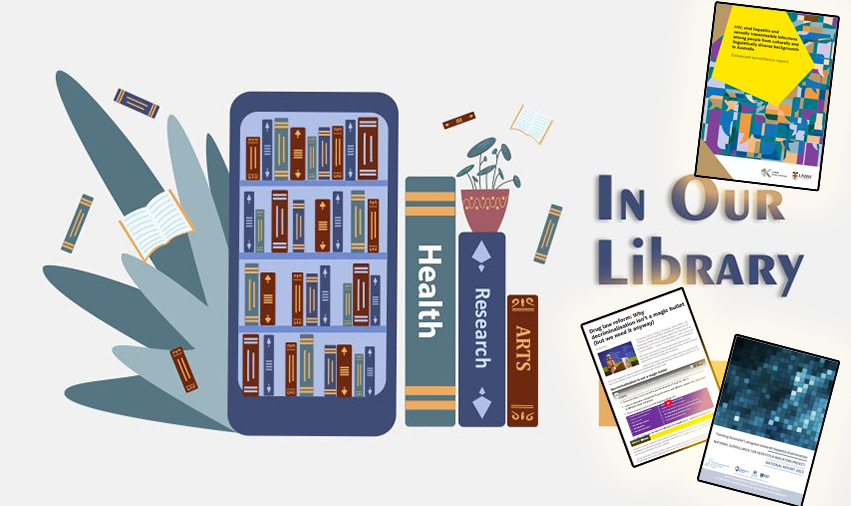The elimination of hepatitis B and hepatitis C is one of the key strategies outlined in a set of guidelines addressing the alarming rise of liver cancer cases and associated deaths in Australia. Titled the Roadmap to Liver Cancer Control in Australia, other actions recommended in the plan include community awareness raising, and the improvement of access and support to services for communities at higher risk of liver cancer.
Launched in March 2023, the Roadmap identifies priorities needed for the next two, five and ten years to reduce disease burden and rate of liver cancer, and improve outcomes and survival rates for Australians affected by the disease.
Among the actions recommended are:
- improvement of data usage for more effective targeting of at risk groups, prevention strategies such as the elimination of hepatitis B and C,
- raise awareness in higher risk communities including Aboriginal and Torres Strait Islander people and culturally and linguistically diverse groups,
- increase awareness of risk factors and prevention among community and primary health care workers,
- earlier identification of hepatitis B, hepatitis C and advanced liver disease in primary care settings,
- improved screening for advanced liver disease and monitoring of hepatocellular carcinoma (HCC) with greater availability of tests and equipment,
- culturally friendly access to diagnosis, treatment and support for people with HCC or at risk.
Liver cancer is the fastest growing cause of cancer-related deaths in Australia, having rapidly increased in incidence and deaths in the last 40 years. The incidence of liver cancer has risen from 1.8 per 100,000 in 1982 to 8.7 per 100,000, and this trend is expected to continue unless steps are taken to prevent the development of the disease in people who are at risk.

While there are many types of liver cancers, the bulk of liver cancer cases are HCC. This means A significant proportion of liver cancers can be prevented by eliminating the transmission of hepatitis B and hepatitis C which are the leading causes of the HCC.
Early detection of hepatitis B and hepatitis C infection followed by treatment to cure for hepatitis C and monitoring with appropriate clinical management will go a long way towards reducing the development of liver cancer in people currently living with the viruses. Management of close contacts, with vaccination where applicable, and other harm reduction strategies to reduce the transmission of these two viruses will ultimately contribute to the lowering of liver cancer incidence.
Liver cancer risks also include behavioural and metabolic factors that are associated with other chronic diseases. They include excessive alcohol use, tobacco consumption and the excess accumulation of fat in the body. Accordingly, the Roadmap recommends the funding of preventive health actions for non-communicable diseases, especially around tobacco control.
… improving access for these communities by providing culturally-friendly support to help patients who are receiving HCC care, navigate the health system.
Recognising the higher risk of liver cancer in some population groups, the Roadmap has called for targeted education campaigns to increase liver cancer awareness in Aboriginal and Torres Strait Islander communities and culturally and linguistically diverse groups. In addition, it is calling for improving access for these communities by providing culturally-friendly support to help patients who are receiving HCC care, navigate the health system.
The Roadmap also pointed out the need to link collected data to surveillance and screening of liver cancer. Applying data around patient characteristics and socio-economic factors to liver cancer diagnoses and outcomes will support better identification of people at higher risk of developing liver cancer and facilitate measures to reduce liver cancer incidence and improve outcomes.
In South Australia…
Cancer Council SA (CCSA) Manager of Prevention and Advocacy, Christine Morris, says CCSA welcomes the launch of the Roadmap and supports the Priority Actions outlined in the document.
“We are building relationships with key organisations to support activities that are already underway,” she said. “In future we will broaden our work in liver cancer control to focus on prevention, immunisation, advocacy and support. We hope to achieve this by building effective partnerships and working in culturally appropriate ways.”

She pointed out that CCSA’s current key services are in line with the Roadmap’s Priority Actions. This includes its confidential information and support line Cancer Council 13 11 20.
“It is open to anyone. People living with cancer, their families, carers and friends, the public, workplaces, and health professionals,” she added. “We can talk to you about the effects of specific types of cancer and how to cope with treatments and side effects, provide a listening ear for you to share your experiences, provide emotional and practical support and link you to a range of support services, such as legal and financial assistance and support groups.”
In addition, CCSA provides free, non-judgemental and confidential counselling services to patients, their family and/or carers, including bereavement counselling. It also offers low-cost accommodation for patients and their carers travelling from regional areas to Adelaide for treatment and cancer related appointments.
The Roadmap to Liver Cancer Control in Australia was developed and published by Cancer Council Australia and funded by the former Department of Health, now the Department of Health and Aged Care.
Last updated 14 March 2024
More from:
Enjoyed this article? Subscribe to be notified whenever we publish new stories.
Subscribe for Updates









